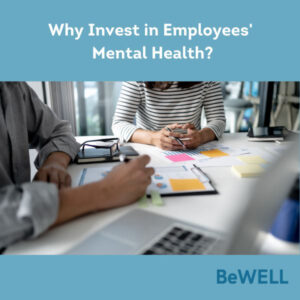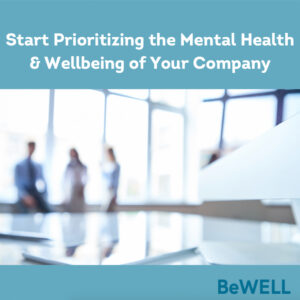By: Liz Buehler Walker
Mindfulness is a word increasingly used when describing how we can be more in touch with ourselves, our surroundings, and our purpose in life and in work. But the meaning of mindfulness can be elusive until you have experienced it. Studies that include mindfulness and meditation are giving quantifiable numbers to the qualitative experience that people have had for thousands of years. In our modern context in the workplace, studies have shown that meditation and mindfulness practices can increase employee productivity by 120%, decrease absenteeism by 85%, reduce the experience of anxiety by 60%, and result in a related 520% profit increase.
Introducing mindfulness into the workplace is a win-win because it can boost the company’s success and profit, and equally importantly contribute to a more psychologically safe work environment where employees enjoy more satisfaction and greater wellbeing.
BeWELL at Work brings our integrative mental health care model directly to all levels of your company from entry level to top leadership. Our science backed approach includes mindfulness as a foundational offering due to the myriad of benefits it cultivates individually and interpersonally.
What is Mindfulness?
In its broadest sense, mindfulness is defined as non-judgmental awareness of the present moment. It is noticing what is, which gives us a chance to respond to our reality rather than impulsively reacting to our emotions. Mindfulness is used in many areas of life – eating, communicating, working, movement and of course meditation. You may have found yourself spontaneously in a mindful state, where you were completely engaged in a creative activity, for instance. Time seems to slow down, you are simultaneously focused and open to creative inspiration, and totally clear about the right next step in your endeavor. It’s a particular state of aliveness that feels fulfilling and produces a generative outcome.
How do you become “Mindful”?
One of the crucial aspects of mindfulness is slowing down. It’s hard to notice the subtleties of your experience when you are moving at a fast pace. Modern life can feel far removed from the times of the ancient sages who were meditating and gaining wisdom from time spent quiet, still and reflective. But numerous current scientific studies are pointing out the benefits of the ancient mindful practices as a way to balance out the hum of technology, information overload and high stress in today’s world. Breathing practices, short but consistent meditation, movement to connect the mind and body are all ways to access mindfulness. When we find awareness of our nervous system response (am I in fight/flight mode or in a calm, responsive state?), we are no longer beholden to the whims of our emotions, and a number of life-changing realizations arise.
Why Mindfulness in the Workplace?
Numerous studies have shown powerful benefits to mindfulness and meditation. Here is a short list.
INCREASED
- Attunement to colleagues’ non-verbal communication, resulting in better relationships and communication
- Focus and creative problem solving
- Sense of wellbeing and creative satisfaction, resulting in higher employee retention rates
- Engagement and morale, which can lead to up to a 200% ROI
DECREASED
- Stress and stress-related disease
- Depression and up to 60% decrease in anxiety
- Insomnia by 50%
- Job burnout, especially for healthcare professionals and teachers
If you are interested in learning more about the BeWell at Work for your team, book a consultation where we’ll get information to tailor a boutique offering specified to your needs.
Sources:
https://comparecamp.com/meditation-statistics/#TOC4
https://www.latimes.com/archives/la-xpm-1995-06-05-ss-9814-story.html




